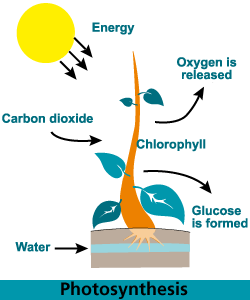Nutrition In Plants

Q1: Define Nutrition.
Answer: The process of taking in food and its utilization by the body is called nutrition.
Q2: What are nutrients? Name the different nutrients.
Answer: Nutrients are chemical substances present in our food that provide energy and other materials required by the body to live and grow.
Examples of nutrients are:
① Carbohydrates
② Proteins
③ Fats
④ Minerals
⑤ Vitamins
Q3: Name the two modes of nutrition.
Answer:
① Autotrophic
② Heterotrophic
Q4: What are autotrophs?
Answer: Organisms which can prepare their own food from raw materials (like mineral and water) are called autotrophs. e.g. green plants.
Q5: Based on eating habits, in what categories animals are divided?
Answer:
① Herbivores: Plant eaters e.g. cow, buffalo, goat etc.
② Carnivores: Meat eaters e.g. lion, tiger etc.
③ Omnivores: eat both plants and animals e.g. human, bear etc.
Q6: Name the process by which autotrophs prepare their own food.
Answer: Photosynthesis
 |
| Pitcher Plant |
Q7: Give two examples of insectivorous plants.
Answer: Pitcher plant, Venus fly trap.
Q8: Name the scientist who experimentally demonstrated that plants produce oxygen and purify air.
Answer: Joseph Priestley
Q9: What is photosynthesis?
Answer: It is the process by which green plants prepare their own food is called photosynthesis. The chlorophyll containing leaves in the presence of sunlight converts carbon dioxide and water into glucouse (carbohydrate sugar) and produces oxygen. Later this glucouse is converted into starch and gets stored in plants.
Sunlight
Water + Carbon dioxide -----------------> Starch + Oxygen
Cholorophyll

Q10: What are the four things essential for photosynthesis.
Answer:
① Chlorophyll
② Sunlight
③ Carbon Dioxide
④ Water
Q11: For what purpose iodine test is used for?
Answer: To detect presence of starch.
Q12: Fill in the blanks
⑴ The food prepared by plants is stored as _________
⑵ In photosynthesis, the sunlight energy is captured by the pigment in plants called ________.
⑶ Plants which obtain food from dead and decaying matter are called __________.
⑷ Amarbel is an example of __________.
⑸ Basic functions which allow living organisms to live on earth are called _________.
Answer:
⑴ starch (carbohydrates)
⑵ chlorophyll
⑶ saprophytes
⑷ parasite plant
⑸ life processes
Q13: What are stomata?
Answer: These are tiny pores present on the surface of leaves. Through stomata exchange of gases i.e. Carbon Dioxide and Oxygen take place. Loss of water also take place through stomata (called transpiration).
Q14: Name the cells that control the opening and closing of stomata?
Answer: Guard cells
Q15: How does photosynthesis occur in desert plants?
Answer: In desert plants to minimize water loss, leaves are reduced to spines. Most of the photosynthesis is carried by the green stem.
Q16: What are variegated leaves? Give examples of such plants.
Answer: Some plants have green or white or other colour parts in the same leaf. Such leaves are called variegated leaves. Examples are: croton, money plant and coleus.
Q17: Which is the ultimate source of energy for all living organisms organisms?
Answer: The sun
Q18: How are heterotrophic plants are categorised are categorised?
Answer:
① Parasitic plants
② Saprophytic plants
③ Insectivorous (Carnivorous) plants
④ Symbiotic plants
Q19: Does Cuscuta (Amrbel) have chlorophyll? How does it prepare its food?
Answer: No it does not have chlorophyll. It is a parasitic plant which absorbs food from readymade plants.
Q20: Name the structures present in Cuscuta that helps it in climbing?
Answer: Haustoria
Q21: What are symbiotic plants? Give an example.
Answer: Plants that live in association with other plants and share shelter and food are called symbiotic plants. Lichens show symbiotic relationship i.e. association of green alga and fungi. Green alga prepare food by photosynthesis while the fungi provide mineral and water.
 |
| Lichens |
Comments
Post a Comment